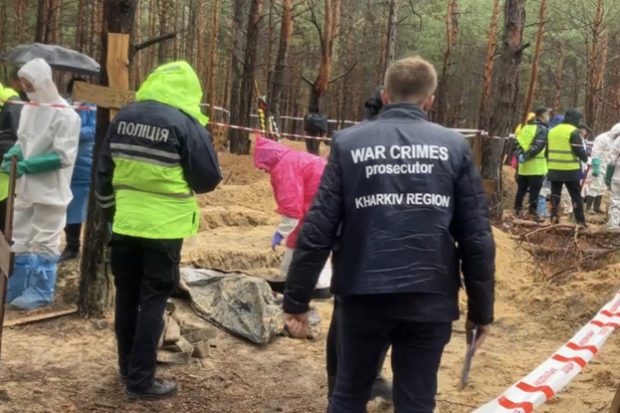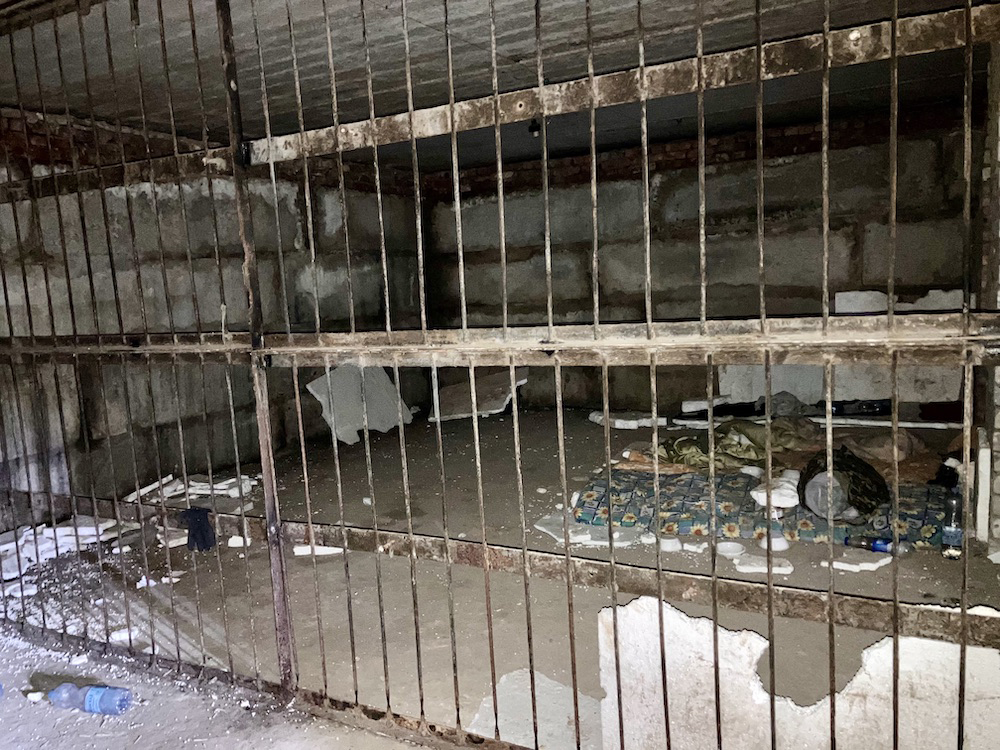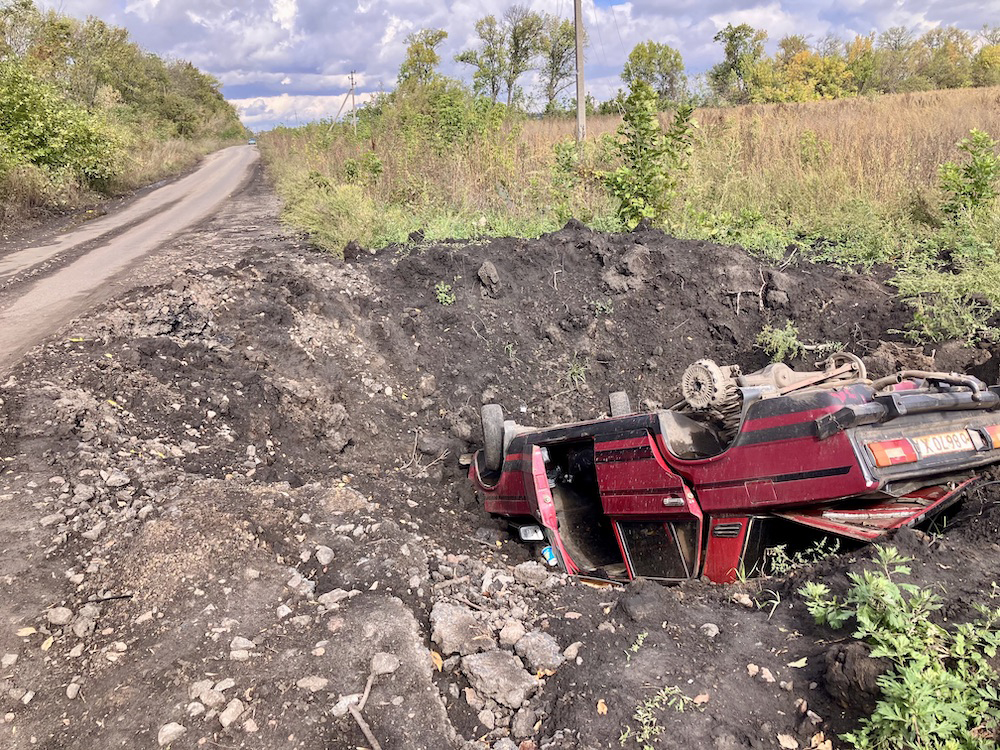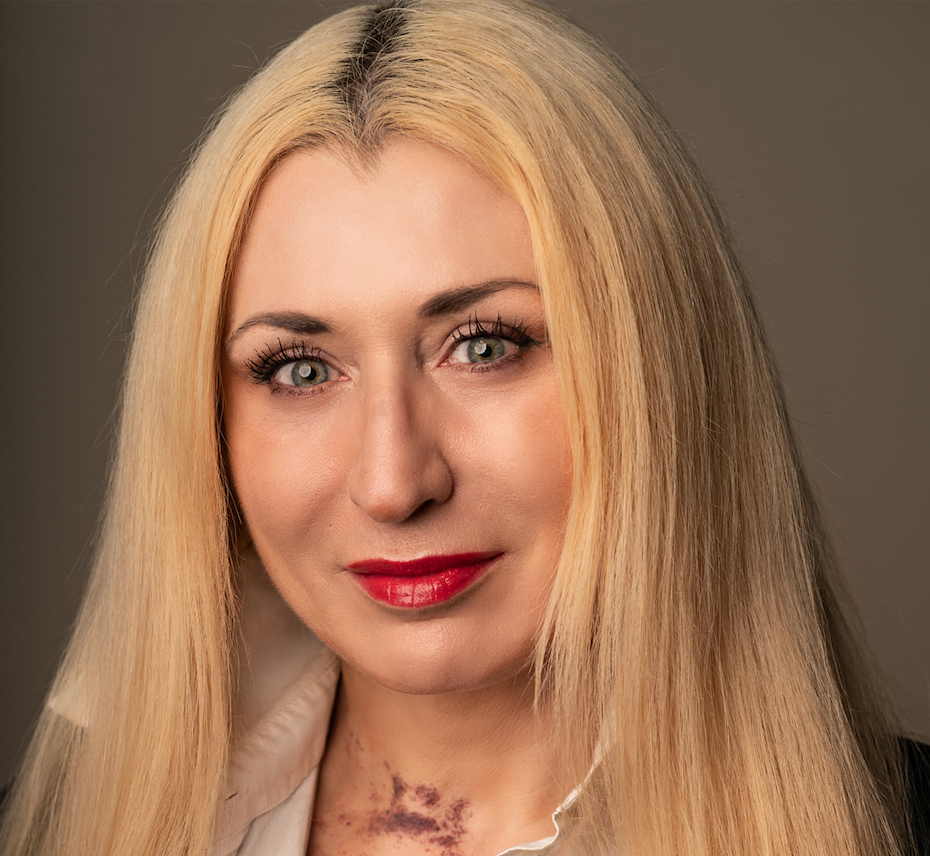
On Sept. 23, I witnessed law enforcement officers completing the exhumation of 447 bodies, including 425 civilians, five children and 22 servicemen, from Izium mass graves. The chief of the Kharkiv regional police, Volodymyr Tymoshko, present at the site, reported that many bodies had signs of violent death and torture, with hands tied behind their backs and ropes around their necks. Evidence of castration and mutilation was present.
Tobias Thyberg, the Swedish ambassador to Ukraine, who arrived at the burial site with a delegation of EU diplomats, said in an interview, “Russia has committed systematic war crimes in Ukraine from Day 1 of its invasion.
“The president of the Russian Federation and the government that he leads have made it absolutely clear that their objective is to destroy the Ukrainian nation.
“Sweden supports Ukraine, both militarily and economically, and in humanitarian terms and also with the important work of ensuring the culpability for the crimes that the Russian Federation has committed.”
Claud Wild, the Swiss ambassador to Ukraine, said, “What we see here—there are no words. We are already supporting the General Prosecutor in the inquiries on war crimes.

“It is very important to document what is happening here so that those who did it don’t get away with it. We are facing war crimes here…When you see this, there is no doubt that the [Russian] government that has unleashed the war is using terrorist means; we have the evidence in front of us.”
Arad Benko, the Austrian ambassador to Ukraine, added, “For us, it was very important to come here to Izium, to see what has happened, and to see the effects of the war and the war atrocities that have taken place here. It is a really shocking moment…
“We have a very clear position towards the Russian aggression in Ukraine: We are standing on the Ukrainian side, and the fact that I am here today is also a symbolic demonstration on which side we stand.”
“What we have witnessed here today, at this mass burial site, in Izium, has signs of the most heinous war crimes,” said Matti Maaskias, EU ambassador and the head of the EU delegation in Ukraine.
“These war crimes must be tried in court,” adds Maaskias, “and, after a visit to this site, for which one has no words, it is clear that the international tribunal must be established as soon as possible and the perpetrators must face trial.
“The EU supports Ukraine in winning this war, and we will do this as long as needed, supporting the people of Izium with humanitarian aid and the people of Ukraine with documenting these crimes.”
Interviews with several survivors and victims’ family members in the Kharkiv Oblast revealed more war crimes against the Ukrainian population. In many towns and villages, the Russian occupying forces kept prisoners, mostly civilians, in basements of residential and industrial buildings, including a vegetable warehouse, a police station and a railroad station that we visited.
The Russian servicemen forced local workers to weld metal human cages for their neighbors. The basements did not have light, heating, beds, toilets or washing facilities. The survivors reported that they were scarcely fed and did not receive water on some days.
The Russian military used hunger and electric torture to interrogate civilians, and more cruel methods to try the former Ukrainian military.

Based on the reports of local residents, the Russian military consumed high volumes of alcohol on a regular basis. This was confirmed by the large amounts of empty wine and beer bottles left in the torture basements and pits in Izium, Kozacha Lopan and other settlements.
Chechen military serving in Kadyrov’s troops as a part of the Russian Federation army did not drink alcohol as they were observant Muslims but rather smoked marijuana and demanded that locals supply the cannabis.
Oleksandr, 49, was detained by the Russian military in the town of Lyptsi and currently experiences heart pain after having been electrocuted in the torture chamber of a basement.
Liudmila, 46, is looking for her husband Evhen, a former military officer, who was detained and kidnapped by the Russian military in the recently liberated village of Kozacha Lopan, five kilometers from the Russian border. Her son, Mykola, arrested at the same time as his father, survived and returned home to tell the story.
Vitaly, formerly with the Ukrainian military, was transported with a bag over his head, his hands tied, between three different locations in Kozacha Lopan. He suffered two broken ribs, wounds on his thighs and chest pain, and now experiences frequent panic attacks.
The roads around Kharkiv are still littered with burned, destroyed and abandoned Russian military equipment and vehicles marked with the letter “Z,” a sign used by both military and civilians in Russia as a symbol of Russian patriotism, and “special military operation,” a term used to refer to the invasion of Ukraine by the Kremlin.
At a checkpoint 125 kilometers from Izium, the bodies of Russian soldiers were left behind by their fleeing compatriots. The Ukrainian police were working on collecting the bodies, taking DNA samples, with the intent to send the remains to their families, the chief of police of the Kharkiv Oblast said.
The fields, forests and roads, as well as towns and villages, needed to be mine cleared before the area could be cleaned completely. Occasionally, the Russian military mined corpses as well, said some Ukrainian army servicemen and the police.
In the city of Kharkiv, a visit to the mostly destroyed district of South Saltyvka proved the remarkable resilience of the residents. Many stayed in the damaged buildings, boarding the windows, fixing what was salvageable and even attending to the lawns. Roads and some stores were already repaired despite daily attacks.
We examined the site following a Russian artillery attack. The district looked similar to destroyed areas in Bucha, Irpin and Hostomel, but with the damage on a larger scale. The landscape had the feel of an apocalyptic sci-fi film.
Yet, most Kharkiv residents refuse to leave their homes despite the daily bombardments. A Russian literature professor, Yuri, would not part with his daughter, who volunteered for the Ukrainian military. Russian soldiers occupied his cottage in the outskirts of Kharkiv and burned his library of rare Russian and Ukrainian books.
Yuri, a Russian-speaking Jew, experienced anti-Semitism in the Soviet Union but never in independent Ukraine and never had any issues speaking Russian. He said that even though the vast majority of the Kharkiv population was Russian-speaking, they identified as Ukrainians, not Russians.
Oleksii, 42, an internally displaced person originally from Crimea, left his home in 2014 after the Russian Federation annexed the Ukrainian peninsula. He expressed hope to reunite with his family in the near future after the Ukrainian army liberates Crimea.
Vasyl, a rock singer and volunteer, lived next to a kindergarten shelled by the Russian troops, leaving a crater at a playground. A driver from Vasyl’s volunteer team was recently killed by another Russian shelling while they were delivering bread to people in nearby villages. Vasyl, who was wearing a hoodie with the caption Kharkiv: Reinforced Concrete, said, “We live here. Kharkiv needs us. Ukraine needs us.”

